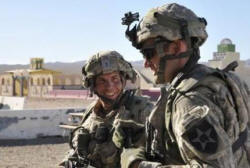|
 U.S.
military probe of Afghan shooting found Bales' camp had lax discipline U.S.
military probe of Afghan shooting found Bales' camp had lax discipline
 Send a link to a friend
Send a link to a friend
[August 19, 2015]
By David Alexander
WASHINGTON (Reuters) - The month before he
killed 16 Afghan civilians in a shooting rampage, Army Staff Sergeant
Robert Bales bloodied the nose of an Afghan truck driver in an assault
that was not reported to his camp commanders, according to a report
released on Tuesday.
|
|
 The assault, and the failure to report it to senior officers, was
one of several signs that the post where Bales served in Afghanistan
was suffering from "low standards of personal conduct and
discipline," said the military's administrative investigation of the
2012 shooting incident. The assault, and the failure to report it to senior officers, was
one of several signs that the post where Bales served in Afghanistan
was suffering from "low standards of personal conduct and
discipline," said the military's administrative investigation of the
2012 shooting incident.
Some U.S. troops at Camp Belambai in Kandahar Province used alcohol
and steroids and made ethnic or racial slurs against Afghans, a lax
atmosphere that appeared to have been tolerated by some mid-level
leaders, the investigation found.
The week before the shootings, Bales used steroids while on a
mission and one fellow non-commissioned officer was worried about
his erratic behavior, but those concerns were not passed on to camp
leadership, the report said.

It also found that some of Bales' superiors at the camp held him in
such low regard that they bypassed him and gave tasks directly to
his subordinates.
Despite the findings, the investigation concluded the behavioral
issues observed at Camp Belambai "had no effect or contribution
whatsoever" to the shooting spree by Bales, who left the base before
dawn on March 11 and opened fire at family compounds in two
different villages near the outpost.
Bales, a decorated soldier with four combat tours in Iraq and
Afghanistan, was sentenced to life in prison without parole in
August 2013 after pleading guilty to killing 16 unarmed Afghan
civilians, mainly women and children.
[to top of second column] |

The long-withheld report was released by the military on Tuesday in
response to Freedom of Information Act requests. Because it occurred
at the same time as a criminal investigation, the administrative
probe did not interview Bales and others linked to the case.
While concluding the command climate at the camp was not related to
the killings by Bales, the investigation found that commanders
should have had "much greater situational awareness of the
discipline of its members."
"At a minimum ... leadership should have known about the incident in
which Staff Sergeant Bales assaulted the truck driver and should
have known about concerns of Staff Sergeant Bales acting erratically
due to his use of steroids," the report said.
(Editing by Jonathan Oatis)
[© 2015 Thomson Reuters. All rights
reserved.]
Copyright 2015 Reuters. All rights reserved. This material may not be published,
broadcast, rewritten or redistributed.
 |